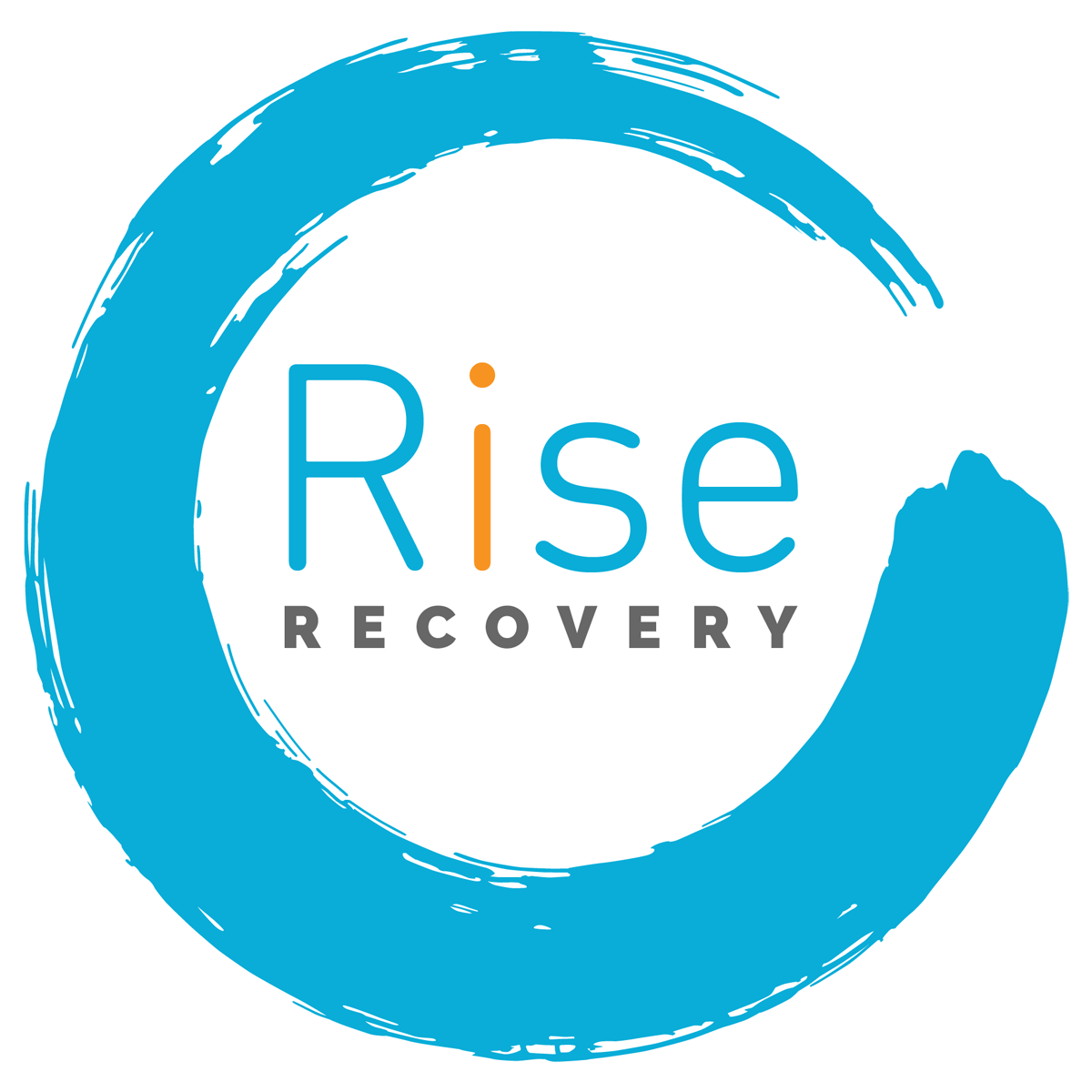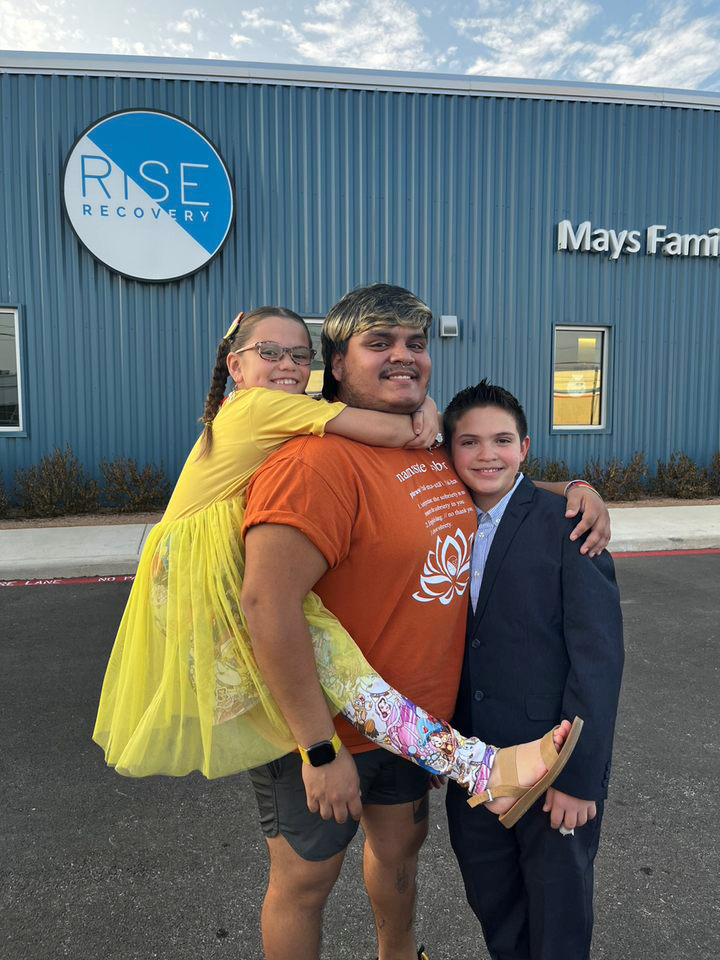Jovan Gonzales works as a youth peer support recovery coach at Rise Recovery. Like all members of our program staff, Jovan is a person in long-term recovery from substance use and has an amazing story to tell.
Favorite Ice Cream: Lemon Cookie Ice Cream
Favorite Color: Yellow
Favorite Flower: Sunflower
Go-To Karaoke Song: What’s New Scooby Doo? by Simple Plan
Hobbies: Sleeping/ Powerlifting
Sobriety Date: June 12, 2021
Q: What’s a normal day at work like for you?
A: Chaos! As a member of the youth program staff, my day starts at 4:30 PM after our recovery high school, Rise Inspire Academy, ends their day. Usually, about eight students hang out after school, before we start the evening group meetings. Those three or so hours between school and meetings we spend hanging out with the youth. Keeping them engaged. Letting them be teenagers. There’s always something going awry or some drama going on. I listen, offer solutions, or sometimes just hear them out. So often, our participants don’t have a lot of experience with just being heard. They are always being directed or told how to navigate the situations they encounter every day. So it’s nice for them to just kind of let it all out. After that, we have our APG (Alternative Peer Group) meetings.
Q: What happens at an APG meeting?
A: I remember the very first one I ever attended before I was officially a member of the Rise Recovery staff. I was technically just kind of volunteering then. Auditioning for the role. The way the youth are able to articulate their wants and needs in these situations really surprised me. I remember when I was 15, 16, 17 years old and not able to articulate the way these kids do. So now, to be in a room of teenagers who can clearly convey the situations they are experiencing and how it makes them feel, is a really unique experience. After the meetings, we have a whole lot of fellowship (social time with peers.)
Q: What is a goal for you when it comes to the youth you work with at Rise Recovery?
A: I feel one of the main things I strive for at Rise is to create a safe and secure environment for them [youth participants] to feel seen and heard. I strive for that every day because I never had that growing up. I think it’s really important. Listening is a huge aspect of what we do. If the youth don’t trust us, if they don’t share with us, then we can’t help them.
Q: Do you hold activities? When and where?
A: We hold activities on Fridays and Saturdays. Depending on the weather, we may go off campus or stay on site. The focus of our activities is to show the youth participants how to have fun again without the use of substances in a secure environment around people who want to stay sober. Our activities sometimes offer unique experiences our youth may never have had before. For example, we did a candle-making activity once. And we had a new participant who hadn’t really been interacting in our meetings. However, during the candle-making activity, they got curious and watched with wide eyes. They really participated and stayed engaged with the activity which allowed the new participant to start interacting with their peers for the first time. After that activity, the new participant started opening up and was more receptive to sharing in groups. They started staying after the meeting to participate in fellowship. So the activities are fun, but they also provide a low-stakes opportunity for youth to engage with the staff and each other; to integrate into the recovery community in a low-stress situation.
Q: What’s your favorite part of the job?
A: PTO! [Paid Time Off] It’s the first time I’ve had a job that offered PTO. But, I don’t think there’s a specific part that’s my favorite. I know when I was still on probation, as I was finishing probation, that I wanted to do some kind of recovery coach position. I was looking at Lifetime Recovery and another one I was considering. Then Rise really just kind of fell into my lap. A former employee made a post on Facebook asking if anyone was interested in this position. I remember seeing it and thinking, “That’d be super dope! But it couldn’t be me.” Then 20 minutes later, I thought, “I’m going to reach out.” The next day I did a phone interview. Two days after that I came to the campus to see how things go and if I meshed well with the youth and other staff. That was a unique experience for me. I knew I wanted to do something in the recovery field, but I never, NEVER, expected to be working with teenagers. As intimidating as it was originally, looking back I try to give a lot of what I didn’t have growing up. I think that’s kind of my favorite part: to be for someone else what I didn’t have.
Q: What’s the hardest part of the job?
A: I think the hardest part of the job is when a youth comes in having a really hard time, but they aren’t yet willing to accept help. There are some youths who come to us but are content with maintaining their current lifestyles. They have no intention of changing or getting help truly. It’s really disheartening when they tell you the stories and things that they’re going through, you give them a handful of solutions and options, and they refuse to consider it. Then they come back later after having these negative experiences, new traumas for them. It’s really difficult when they’re here, but they’re refusing to accept any kind of guidance.
Q: You submitted a picture of yourself with your siblings. What do you think your impact is on them as it relates to the work you do?
A: I feel, living in the home, I might have a more significant impact. But I also have to consider the negative impact that my substance use had on them. By doing the work that I do now and mainstreaming my own recovery and sobriety, I can be a positive influence for them. I know when I was still using, there were certain points when I was living at home with my family, and I would have relapsed the night before. My main concern was to keep it from the kids because I didn’t want them to know. For one, because of shame and embarrassment, and for two they were just really young and didn’t need to know. So now, being able to be sober and in recovery, I’m able to go be a functioning, productive member of not only my community but my family.
Q: Are you proud of where you are now?
A: Yeah. If you had asked me a year ago where I’d be, this wouldn’t be it. At this point a year ago, I was still on probation. I was still in sober living (privately owned homes for people recovering from drug or alcohol issues.) I was just over six months sober and still kind of struggling. I was working at a restaurant which I really disliked. I was working on the steps, gaining trust, and rebuilding relationships. In the year since I graduated from the probation program. I am done with sober living. I have my own apartment. I work out. I have pretty great relationships with a lot of people that I didn’t stay in touch with for a long time. It’s all coming together.
Q: What does the future hold for you?
A: I intend to stay at Rise for a fat minute. But I want to go back to school and get my Masters Degree in Family Therapy. That’s probably going to be ten years before I finish. One of the things about substance use is that you have to rebuild your emotional and social skills again. Once you start using substances, they stop developing. Now I’m just trying to figure out how to be an adult. It’s the first time I’ve lived by myself. I have bills under my name! I spent a lot of years in my substance use disorder, and now I’m just taking time to really figure out what it means to be a person, an adult. Be responsible. That’s really cool.
Q: Any last thoughts?
A: I always tell the kids to be good, or be good at it. And they tend to be very bad at it. So I advise them to be good.





